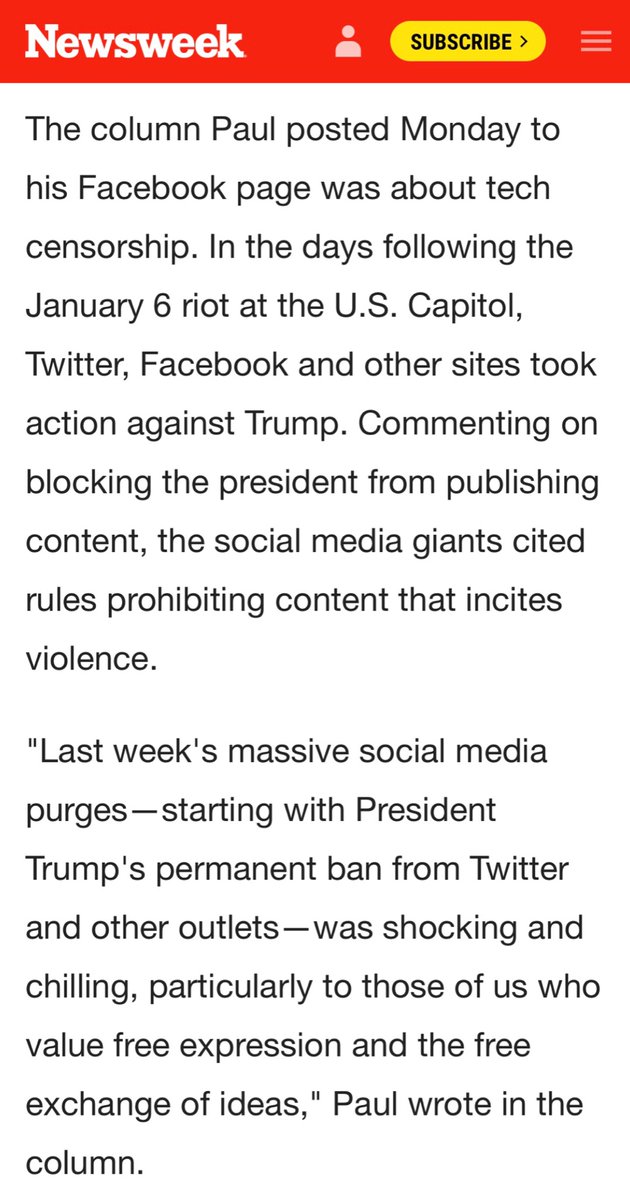"If freedom of speech is taken away, then dumb and silent we may be led, like sheep to the slaughter." - George Washington, March 15, 1783
Silencing "wrong" ideas will eventually destroy our ability to discover the truth.
“[They say] these are all private companies. They should be able to do whatever they want. But here’s the problem with that: our free speech rights have... become digitized, privatized, and centralized in the hands of a small number of players, a handful of oligarchs.” twitter.com/DavidSacks/sta…
Repealing Section 230 will not get us freer speech. “If Internet platforms are required to remove any potentially problematic content, corporate risk-aversion will lead them to over-restrict speech to avoid any potential liability.” link.medium.com/Fsalz08RGab
Free speech has never meant “anything goes”. Supreme Court has defined 9 major exceptions including incitement, fighting words, defamation, and fraud. Big Tech could have operated within that framework. Instead they’ve usurped the power to define allowed speech. Real issue.
A right is something that can’t be taken away from you. In the modern world, speech occurs online. If FB/Twitter/Apple/Google/Amazon all cancel you, to what court and under what legal theory can you appeal? There is none. Now explain how you still have a right to free speech.
The internet digitized speech along with many other things. If you can’t speak online, or that ability is fully at the whim of a tech cartel with no due process or ability to appeal, you have no speech right. Hatred of Trump is blinding people to that fact.
Offline: our speech rights are defined and protected by the Bill of Rights, a precious birthright. Online: our speech rights are defined by a Terms of Service, written, interpreted, and modified at will by tech oligarchs, with no right to appeal. Makes sense.
Speech can be regulated under the First Amendment in ways that would have taken down the most incendiary tweets of Trump and the other rabble-rousers. The actions of Big Tech go well beyond that. Abridging speech should always be narrowly tailored.
Apparently you are a “free speech maximalist” if you notice that speech has been digitized, centralized and privatized in a way that no one voted for.
According to Newsweek, Paul’s offense was to post a blog on tech censorship. So Facebook censored Paul for criticizing Facebook’s censorship. Anyone see where this is going? pic.twitter.com/fwLZZXMWFc twitter.com/RonPaul/status…

The first question of law is jurisdiction: who decides? Instead of thinking about which views you want to censor, think about who has the power to censor. Even if you like the result now, do you really have confidence in their judgment and process for all future cases?
It’s an old canard that anyone who defends the principle of freedom of speech must believe in the worst things being said. That’s not an argument, it’s an intimidation tactic.
De-platforming is an extraordinarily consequential punishment that can be meted out with no rights and no due process by monopolies that no one trusts, yet people are going along with it because they like this week’s decision.
An individual’s right to free speech is not unlimited. But neither is a monopolistic consortium’s right to deny service. pic.twitter.com/EG8B9yRCqM















